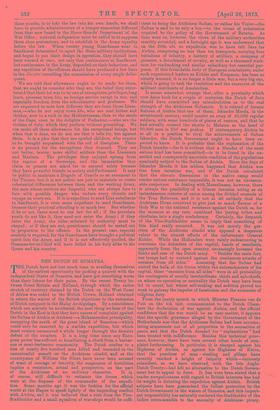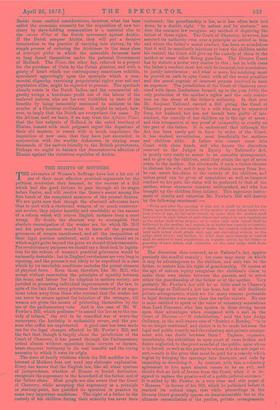THE DUTCH IN SUMATRA.
THE Dutch have not lost much time in availing themselves of the earliest opportunity for picking a quarrel with the independent States of Sumatra, and have got something worse than their labour for their pains. By the recent Treaty be- tween Great Britain and Holland, through which the entire stretch of territory claimed by the Dutch on the West Coast of Africa was ceded to the British Crown, Holland obtained in return the waiver of the British objections to the extension of Dutch conquest in the Malay Archipelago. By a coincidence which can scarcely be accidental, the next thing we hear of the Dutch in the East is that they have causes of complaint against the Sultan of Atchin or Atcheen—a Mohammedan principality, occupying the north of the great island of Sumatra—which could only be removed by a warlike expedition, but which must remain unremoved a while longer through the decisive defeat of the invaders. It is a long time since any Euro- pean power has suffered so humiliating a check from a barbar- ous or semi-barbarous community. The Dutch confess to a loss of nearly five hundred men killed and wounded in the unsuccessful assault on the Atchinese citadel, and as the countrymen of William the Silent have never been accused of want of courage or tenacity, the suspension of hostilities implies a resistance, actual and prospective, on the part
of the Atchinese of no ordinary character. It is, of course, still difficult to estimate the forces which were at the disposal of the commander of the expedi- tion. Some months ago it was the fashion for the official world at the Hague to speak lightly of the impending conflict with Atchin, and it was believed that a visit from the Vice- Stadtholder and a small squadron of war-ships would be suffi- cient to bring the Atchinese Sultan, or rather his Vizier—th Sultan is said to be only a boy—to the terms of submission required by the policy of the Government of Batavia. As time went on, however, the views of the military authorities sensibly extended, and a fortnight ago it was understood that on the 20th ult, an expedition was to have left Java for Atchin, comprising no less than ten transports, carrying four battalions of infantry, a battery of artillery, a company of pioneers, a detachment of cavalry, as well as a thousand work- men for roadmaking and similar subsidiary but essential pur- poses. If this formidable body of European combatants, under such experienced leaders as Kohler and Koopman, has been so utterly worsted, it is no longer a little war, but a very big one, which is going to task the resolution and the resources of the militant merchants of Amsterdam.
It seems somewhat strange that, after a proximity which now dates back for a couple of centuries, the Dutch of Java should have committed any miscalculation as to the real strength of the Atchinese Sultanate. It is related of former Sultans of Atchin that one of them, Iskander Moeda, in the seventeenth century, could muster an army of 40,000 regular soldiers, with some hundreds of pieces of cannon, and that he had actually crossed the straits to Malacca at the head of 20,000 men in 250 war prahus. If contemporary Atchin be at all in a position to rival the achievements of Sultan Iskander, the Dutch Government ought to have been ex- pected to know. It is probable that the explanation of the Dutch blander—for it is evident that a blunder of the most serious kind has been committed—is to be found in the un- settled and consequently uncertain condition of the populations nominally subject to the Sultan of Atchin. Since the days of Iskander Moeda, it has seldom happened that Atchin was free from intestine war, and if the Dutch calculated that the chronic dissensions in the native camp would render serious resistance impossible, it was not an unreason- able conjecture. In dealing with Mussulmans, however, there is always the possibility of a Giaour invasion acting as an instantaneous restorer of union among the divided counsels of the True Believers, and it is not at all unlikely that the Atchinese Divan contrived to give just so much flavour of a Holy War to the national resistance against the Dutch as, for the moment at any rate, combined the jarring tribes and chieftains into a single confederacy. Certainly, the delpatch of the Vice-Stadtholder seems to imply that something of this kind really occurred. It was not merely the gar- rison of the Atchinese citadel who opposed a desperate valour to the utmost efforts of the unfortunate General Kohler. While the Hollanders were vainly endeavouring to overcome the defenders of the capital, bands of assailants, apparently from the open country, unceasingly harassed the flanks and rear of the Dutch army. "Besides the main fort, our troops had to contend against the continuous attacks of enemies from all sides." Assuming that the Sultan had united the bulls of his forces within the entrenchments of his capital, these "enemies from all sides" were in all probability the contingents of usually insubordinate chiefs and sub-chiefs, on whose co-operation or neutrality the Dutch may have been led to count, but whose self-seeking and sedition proved too weak to gainsay the impulse of fanaticism and the summons of religious duty.
From the jaunty speech in which Minister Fransen van de Putt on the 4th inst. communicated to the Dutch Cham- bers the declaration of war against Atchin, and the official confidence that the war would be an easy matter, it appears that the specific grievance alleged by the Government of the Netherlands was that the Atchinese Sultan had been accumu- lating armaments out of all proportion to the necessities of peace, and that the Dutch demand for " explanations " had been treated with indifference. Besides this technical griev- ance, however, there have been several other heads of com- plaint forthcoming. In particular, it is charged against his Highness of Atchin, as against his Highness of Shiva, that the practices of man - stealing and pillage have recently reached a height of iniquity which—curiously coincident, as we have observed, with the late Anglo- Dutch Treaty—had left no alternative to the Dutch Govern- ment but to appeal to force. It has even been stated that a tender scrupulousness with regard to British interests has had its weight in dictating the expedition against Atchin. British subjects have been guaranteed the fullest protection by the Dutch Government in the waters of Sumatra, and this import- ant responsibility has naturally rendered the Stadtholder of the Indies extra-sensible to the enormity of Atchinese piracy. Beside these exalted considerations, however, what has been called the economic necessity for the acquisition of new ter- ritory by slave-holding communities is a material clue to the raison d'e'tat of the Dutch movement against Atchin. If the Dutch conquer Atchin, they will put a decisive termination to the practice of carrying into slavery, by the simple process of reducing the Atchinese to the same class of adscripti glebce in which the miserable Javanese have so long found themselves under the paternal Government of Holland. The Times, the other day, referred to a project for the purchase of Cuba by the Cuban planters, and with a gaiety of heart which our contemporary sometimes exhibits, speculated approvingly upon the spectacle which a com- mercial oligarchy, exercising proprietorial rights over soil and population alike, might be expected to present. The spectacle already exists in the Dutch Indies, and the commercial oli- garchy wrings a handsome profit out of the labour of the enslaved natives, who are for ever forbidden to taste of the benefits by being inexorably sentenced to minister to the avarice of a Christian civilisation. It might be unjust, how- ever, to imply that the Dutch are everywhere the same. By the African mail we learn, if we may trust the African Times, that the late subjects of Holland, in the ceded territory of Elmina, lament with such poignant regret the departure of their old masters, or resent with so much impatience the imposition of new ones, that they have just succeeded, in conjunction with the warlike Ashantees, in slaying some thousands of the natives friendly to the British protectorate. Perhaps we ought to balance the demonstrative affection of Elmina against the victorious repulsion of Atchin.



































 Previous page
Previous page